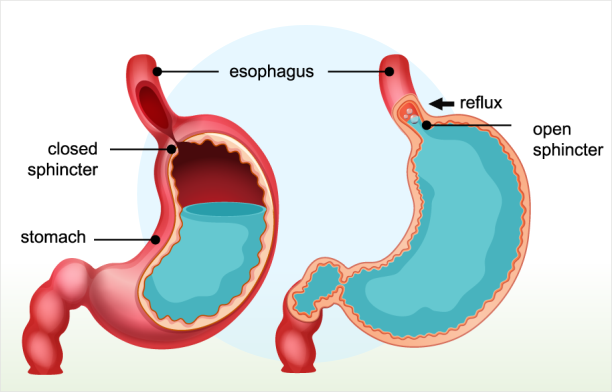heartburn & acid reflux (gerd)
Heartburn occurs as a result of gastric acid that “refluxes” from the stomach into the esophagus, aka “GERD”. Ten percent of Americans experience GERD symptoms daily. Treatment is focused on reducing symptoms through the use of diet and lifestyle modification and or oral medications. Often a diagnostic procedure called an EGD is performed to confirm the diagnosis.
FAQ
What is acid reflux?
Acid reflux occurs when stomach acid flows back into the esophagus, causing irritation and symptoms such as heartburn. Occasional acid reflux is normal, but persistent or severe cases may indicate GERD.
What is GERD (Gastroesophageal Reflux Disease)?
GERD is a chronic condition where stomach acid frequently flows back into the esophagus, causing irritation and inflammation. It can lead to more severe symptoms and complications if left untreated.
What causes heartburn and acid reflux?
Common causes include a weakened lower esophageal sphincter (LES), obesity, pregnancy, hiatal hernia, certain foods (spicy, fatty, acidic), smoking, and certain medications.
What are the symptoms of GERD?
Symptoms can include heartburn, regurgitation (acidic taste in the mouth), chest pain, difficulty swallowing, chronic cough, and hoarseness. Complications may include esophagitis, Barrett’s esophagus, and respiratory issues.
How is GERD diagnosed?
Diagnosis involves a medical history review, physical examination, and may include endoscopy, pH monitoring, and imaging studies to assess the extent of esophageal damage.
Can lifestyle changes help manage GERD?
Yes, lifestyle modifications can help manage GERD. These include weight loss, dietary changes (avoiding trigger foods), elevating the head of the bed, quitting smoking, and eating smaller, more frequent meals.
What medications are used to treat GERD?
Medications include proton pump inhibitors (PPIs), H2 blockers, and antacids. PPIs reduce stomach acid production, H2 blockers decrease acid secretion, and antacids neutralize stomach acid.
Can GERD lead to complications?
Yes, untreated GERD can lead to complications such as esophagitis (inflammation of the esophagus), Barrett’s esophagus (changes in the lining of the esophagus), and an increased risk of esophageal cancer.
When is surgery considered for GERD?
Surgery may be considered for individuals with severe GERD that doesn’t respond to medications or lifestyle changes. Fundoplication is a common surgical procedure to tighten the LES and prevent acid reflux. It is usually considered when other treatments have been ineffective.







